iNumber Number: Jozi Gold (2023)
Sep. 3rd, 2023 09:26 amIf you enjoy a good heist movie and have Netflix, I highly recommend iNumber Number: Jozi Gold**(directed by Donovan Marsh), a heist flick out of South Africa. It gives you a very entertaining foursquare of lawful/chaotic good/evil alignment, humor, fun characters, truly luminous cinematography in a most likely unfamiliar landscape (unless you're from South Africa). (Also violence, but less than in American films.) The protagonists are cop buddies Shoes (straight arrow, gentle family man) and Chili (has vigilante tendencies) who fail in the initial 15 minutes to take down the Hyena Man (bonus larger than life CG hyena) and so are sent down to The Basement by their corrupt boss--whereupon the rest of the plot, involving a Robin Hood gang, a 1972 mint sold for scrap, a dictator's son, that hyena, and an orphanage, unfolds.
( the foursquare )
I think the film must have been shot mainly at sunrise and sunset, because it's filled with a golden light that's perfect for a film about a gold heist.

And I was struck by its meditation on the weight--in all senses of the word--of gold. In the first chase scene, Chili is pursuing the Hyena man while lugging around a bag of gold nuggets. He finally leaves it with a guy in the poor neighborhood he's running through with the admonishment not to open it (!!) When he comes back...
( I used to be the best drill op )
Light, by contrast, has no weight, but transforms. As does fire.

But mainly the film's just propulsively fun, with a great sense of style and a good sound track. And you get to hear Zulu spoken.
What will you do with your one wild and precious krugerrand?

**Not to be confused with iNumber Number: Avenged, an earlier flick with the same main characters.
( the foursquare )
I think the film must have been shot mainly at sunrise and sunset, because it's filled with a golden light that's perfect for a film about a gold heist.

And I was struck by its meditation on the weight--in all senses of the word--of gold. In the first chase scene, Chili is pursuing the Hyena man while lugging around a bag of gold nuggets. He finally leaves it with a guy in the poor neighborhood he's running through with the admonishment not to open it (!!) When he comes back...
( I used to be the best drill op )
Light, by contrast, has no weight, but transforms. As does fire.

But mainly the film's just propulsively fun, with a great sense of style and a good sound track. And you get to hear Zulu spoken.
What will you do with your one wild and precious krugerrand?

**Not to be confused with iNumber Number: Avenged, an earlier flick with the same main characters.
horizontal as well as vertical
Jun. 29th, 2023 10:54 pmWe're watching The Makanai (舞子さんちのまかなないさん; Maikosanchi no makanai san)on Netflix; the present-day story of two sixteen-year-old best friends who leave their northern Aomori town to go to Kyoto to train as maiko (pre-geisha). One of them, Sumire is exceptionally suited to it; the other, Kiyo, isn't--but Kiyo finds her feet as the makanai, the cook, for the house.
In the episode we saw the other day, the mother of the house is walking with a male friend, and she's talking about all the good-luck charms and talismans she has all over the house. "Isn't that kind of burdensome?" her friend asks. And then she gives such a great description of why it's not, and how she feels:
( explanation in screen caps )
I love everyday beliefs like this.
Later on there's a hilarious moment when Sumire asks the accomplished geisha Momoko, whom she's been assigned to as a helper, what Momoko was praying for earlier in the day, when Sumire happened to see her at a shrine. Momoko is super sophisticated and a very cool cucumber--but in that moment she's tired and drunk. Nevertheless, she comes up with the perfect answer:
( There's only one answer to that question )
In another entry maybe I'll talk a little about Kiyo, who manages to be preternaturally sweet without being cloying--I have theories about why, or at least, why for me she hits that balance.
In the episode we saw the other day, the mother of the house is walking with a male friend, and she's talking about all the good-luck charms and talismans she has all over the house. "Isn't that kind of burdensome?" her friend asks. And then she gives such a great description of why it's not, and how she feels:
( explanation in screen caps )
I love everyday beliefs like this.
Later on there's a hilarious moment when Sumire asks the accomplished geisha Momoko, whom she's been assigned to as a helper, what Momoko was praying for earlier in the day, when Sumire happened to see her at a shrine. Momoko is super sophisticated and a very cool cucumber--but in that moment she's tired and drunk. Nevertheless, she comes up with the perfect answer:
( There's only one answer to that question )
In another entry maybe I'll talk a little about Kiyo, who manages to be preternaturally sweet without being cloying--I have theories about why, or at least, why for me she hits that balance.
Life is troublesome
Jun. 17th, 2023 04:15 pmThe other day Netflix laid some real wisdom on ![[personal profile]](https://www.dreamwidth.org/img/silk/identity/user.png) wakanomori and me in the form of a conversation in 逃げるは恥だが役に立つ (The Full-Time Wife Escapist). I recommend this short series! It's funny and insightful, and its characters are unusual and likable.
wakanomori and me in the form of a conversation in 逃げるは恥だが役に立つ (The Full-Time Wife Escapist). I recommend this short series! It's funny and insightful, and its characters are unusual and likable.
The wisdom was in what the awkward, shy male lead (Hiramasa) says to the female lead (Mikuri) in a key moment. She's just said that Hiramasa doesn't need to put up with all the bother and trouble that a relationship with her entails and run off to her "office" in the bathtub.
He speaks to her through the bathroom door:
Subtitles first, actual dialogue second
He then pivots to talking about how, if life is troublesome whether they live together or separately, they might as well live life together and face those troubles together--but what struck me as wisdom was his recognizing that you can keep on cutting troublesome things, irritating things, bothersome things from your life (if you're so lucky as to have the means to do so), but among the things that remain, there'll be something that rises up to take the place of the things you've gotten rid of. You could pare your life down to eating and sleeping--or walking and eating, as he says--and you'd end up finding those things a bother.
And this feels true to me! And it feels especially ominous as it gets to the point when things we actually like doing are whisked away from us in the name of removing a burden, to the point where now you have AI being promoted as being able to write that pesky paper for you, or to help you out with that scene in a story.
We need to resist having the things that make life worth living taken away from us. We don't write stories or compose music or paint paintings or knit sweaters or grow vegetables because we're the best ones to do those things--we do them because they're what make life life: this is what it means for us to be alive. No, I don't want a machine to write a story for me--that is exactly what **I** want to do. Even if I'm not the best at it. And while we're defending our right to the fun stuff, we might also want to reclaim some of the stuff that's more widely acknowledged as troublesome. I'm not saying give up a convenience you truly love, but if there's something you don't mind doing, embrace doing it.
I'm reminded of Nate Masters, a visitor to the Martin Luther King memorial when it was first unveiled in August 2011. I blogged about him back in the day, but that entry is now locked, so I'll paste in the quote here:
(Here's a link to the NPR story, if you want to hear his voice.)
The wisdom was in what the awkward, shy male lead (Hiramasa) says to the female lead (Mikuri) in a key moment. She's just said that Hiramasa doesn't need to put up with all the bother and trouble that a relationship with her entails and run off to her "office" in the bathtub.
He speaks to her through the bathroom door:
Subtitles first, actual dialogue second
If you avoid things that are troublesome and avoid them as much as possible, you'll end up hating even walking and eating. You'll hate even breathing. You may as well be dead, right? Life is troublesome.
面倒を避けて避けて、極限まで避けて続けたら、歩くのも、食べるのも、面倒になって、息をするのも面倒になって、限りなく死に近ずくんじゃないでしょうか。生きていくのって、面倒くさいです。
He then pivots to talking about how, if life is troublesome whether they live together or separately, they might as well live life together and face those troubles together--but what struck me as wisdom was his recognizing that you can keep on cutting troublesome things, irritating things, bothersome things from your life (if you're so lucky as to have the means to do so), but among the things that remain, there'll be something that rises up to take the place of the things you've gotten rid of. You could pare your life down to eating and sleeping--or walking and eating, as he says--and you'd end up finding those things a bother.
And this feels true to me! And it feels especially ominous as it gets to the point when things we actually like doing are whisked away from us in the name of removing a burden, to the point where now you have AI being promoted as being able to write that pesky paper for you, or to help you out with that scene in a story.
We need to resist having the things that make life worth living taken away from us. We don't write stories or compose music or paint paintings or knit sweaters or grow vegetables because we're the best ones to do those things--we do them because they're what make life life: this is what it means for us to be alive. No, I don't want a machine to write a story for me--that is exactly what **I** want to do. Even if I'm not the best at it. And while we're defending our right to the fun stuff, we might also want to reclaim some of the stuff that's more widely acknowledged as troublesome. I'm not saying give up a convenience you truly love, but if there's something you don't mind doing, embrace doing it.
I'm reminded of Nate Masters, a visitor to the Martin Luther King memorial when it was first unveiled in August 2011. I blogged about him back in the day, but that entry is now locked, so I'll paste in the quote here:
You live long enough, son, you're going to have some stories too, I assure you. That's the way this thing is, you understand? We have stories. If we make it through the day, you understand, and rejoice in the morning, we'll make it, you know, peace in that day. It's not hard, life is not hard. It's just a little troublesome sometimes, you know? Just make it through the day, that's all.
(Here's a link to the NPR story, if you want to hear his voice.)
snow, woodland marimba, Netflix
Dec. 12th, 2022 09:07 amIt snowed!
I knocked the snow off the clothesline and it fell all at once, from the entire length of the clothesline, a rope of snow hitting the ground.
I'm back from my dad's house, but while I was there, I found a tiny nature preserve that has been set up across the street from my high school. It's on low-lying land unsuitable for development: a land conservancy has bought it and made it into a preserve, so high school students can learn about wetlands and local people can go for walks.
Because it's a wetland, there are sections with plank walkways to keep you above the water. For one of them, the beams are laid out lengthwise, and when you walk on them, it's musical, like a marimba (you have to turn your sound up to hear; it's a not-great 10-second phone video):
The creator signed it:

The other walkways have the planks laid out crosswise--they don't give the same music (but are fine for walking on!)

I saw an odd but funny and entertaining movie on Netflix, Army of Thieves (2021). In it, a young German bank clerk who has been mastering safecracking in his spare time is recruited to break into a series of bank vaults designed by a master locksmith and themed on Wagner's Ring of the Nibelung operas. (The vaults are named Reingold, Valkyrie, Siegfried, and Götterdämmerung.) For each vault, the guy tells the story of that opera, and the music plays in the background, and then you get an image of all the gears and tumblers moving as he goes into a trance, listening to the clicks and slides and whirs. So cool! And the rest of the gang are hilarious characters. I feel like![[personal profile]](https://www.dreamwidth.org/img/silk/identity/user.png) sartorias would enjoy it.
sartorias would enjoy it.
Weirdly, the movie is a prequel to a zombie film, Army of the Dead. This film is not a zombie film at all! Is this a thing that happens often? A prequel that's a totally different genre from the original film? The only way zombies figure in Army of Thieves is that you hear news stories about this zombie outbreak in Nevada, and sometimes the hero has bad dreams about zombies. I think he's the only carryover from one film to the other...
I knocked the snow off the clothesline and it fell all at once, from the entire length of the clothesline, a rope of snow hitting the ground.
I'm back from my dad's house, but while I was there, I found a tiny nature preserve that has been set up across the street from my high school. It's on low-lying land unsuitable for development: a land conservancy has bought it and made it into a preserve, so high school students can learn about wetlands and local people can go for walks.
Because it's a wetland, there are sections with plank walkways to keep you above the water. For one of them, the beams are laid out lengthwise, and when you walk on them, it's musical, like a marimba (you have to turn your sound up to hear; it's a not-great 10-second phone video):
The creator signed it:

The other walkways have the planks laid out crosswise--they don't give the same music (but are fine for walking on!)

I saw an odd but funny and entertaining movie on Netflix, Army of Thieves (2021). In it, a young German bank clerk who has been mastering safecracking in his spare time is recruited to break into a series of bank vaults designed by a master locksmith and themed on Wagner's Ring of the Nibelung operas. (The vaults are named Reingold, Valkyrie, Siegfried, and Götterdämmerung.) For each vault, the guy tells the story of that opera, and the music plays in the background, and then you get an image of all the gears and tumblers moving as he goes into a trance, listening to the clicks and slides and whirs. So cool! And the rest of the gang are hilarious characters. I feel like
Weirdly, the movie is a prequel to a zombie film, Army of the Dead. This film is not a zombie film at all! Is this a thing that happens often? A prequel that's a totally different genre from the original film? The only way zombies figure in Army of Thieves is that you hear news stories about this zombie outbreak in Nevada, and sometimes the hero has bad dreams about zombies. I think he's the only carryover from one film to the other...
Divine ancestor meet-cute
Jan. 7th, 2022 05:42 pmI really enjoyed the Netflix documentary A Última Floresta (The Last Forest), directed by Luiz Bolognesi and cowritten by him and Davi Kopenawa Yanomami, about the present-day situation of the Yanomami people in Amazonian Brazil and Venezuela. Davi Kopenawa Yanomami is a Yanomami activist who helped get a law passed to protect Yanomami land after gold mining predations in the 1980s led to a fifth of the population dying from mercury poisoning and other sicknesses. The presidency of Jair Bolsonaro has made their situation precarious again.
--But the documentary isn't heavy. It was made in consultation with Davi Kopenawa Yanomami's village; they got to decide what things they wanted to show, and one thing they chose was a reenactment of the coming together of the original ancestors of the Yanomami people. It was SO SWEET.
Originally there was just Omama and his brother, Yoasi--no women. Yoasi managed to copulate with his own leg and produce a baby, but with no mother to nurse it, the baby cried and cried. Omama went off to look for a woman. He tossed a fishing line in the water...
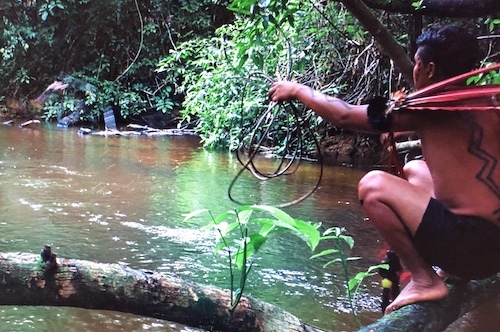
And out came Thuëyoma!
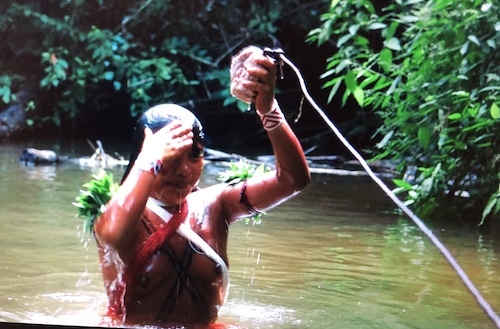
How surprised Omama was!
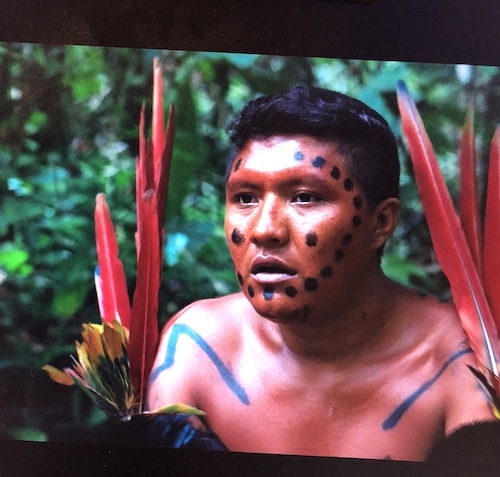
Thuëyoma gives him her best smile ^_^
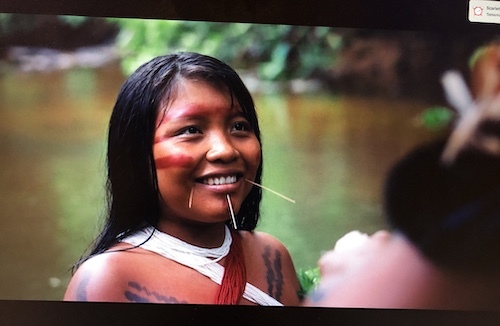
They sit together in a hammock, chatting. "Do you have a boyfriend or husband in the water world?" Omama asks diffidently.
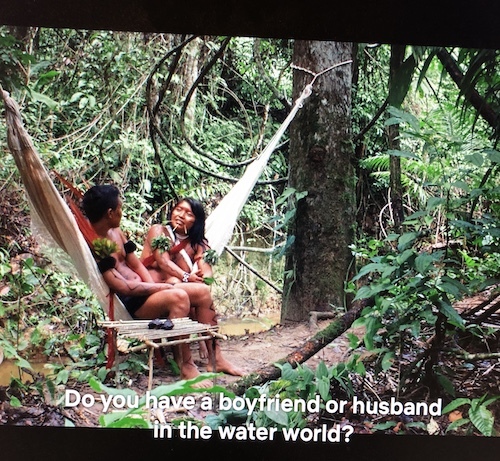
"I don't have a boyfriend or any suitors," she replies.
"How do you feel about that?" he asks.
"When I lived in the underwater forest, I felt alone until you found me," she says. "I was very happy when you fished me out."
--She looked happy, didn't she! And now he looks very happy too:
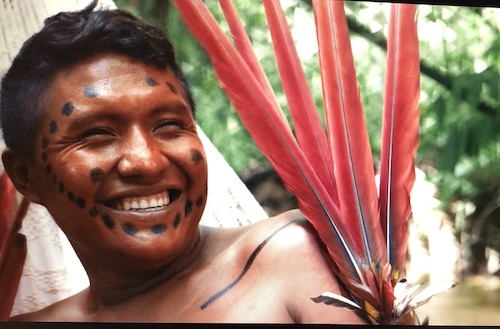
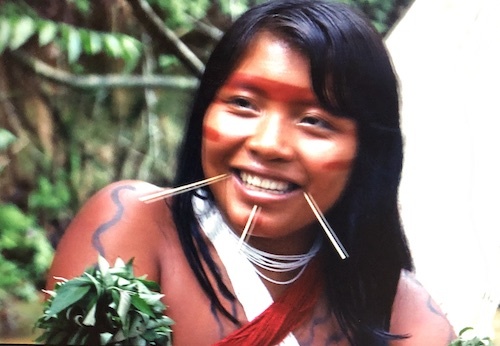
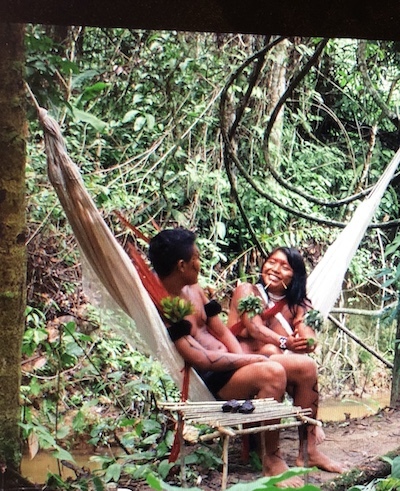
MOST SWEET ANCESTORS EVER.
--But the documentary isn't heavy. It was made in consultation with Davi Kopenawa Yanomami's village; they got to decide what things they wanted to show, and one thing they chose was a reenactment of the coming together of the original ancestors of the Yanomami people. It was SO SWEET.
Originally there was just Omama and his brother, Yoasi--no women. Yoasi managed to copulate with his own leg and produce a baby, but with no mother to nurse it, the baby cried and cried. Omama went off to look for a woman. He tossed a fishing line in the water...

And out came Thuëyoma!

How surprised Omama was!

Thuëyoma gives him her best smile ^_^

They sit together in a hammock, chatting. "Do you have a boyfriend or husband in the water world?" Omama asks diffidently.

"I don't have a boyfriend or any suitors," she replies.
"How do you feel about that?" he asks.
"When I lived in the underwater forest, I felt alone until you found me," she says. "I was very happy when you fished me out."
--She looked happy, didn't she! And now he looks very happy too:



MOST SWEET ANCESTORS EVER.
where moth and rust destroy
Jul. 6th, 2021 07:12 pm“Do not store up for yourselves treasures on earth, where moth and rust destroy (Matthew 6:19)
That's a common enough adage and moral lesson, but for some reason the portrayal of it in our current Colombian series was visually super affecting and got me thinking.
One of the secondary characters is an army officer, undercover in a mission to take down the supply portion of a drug operation, but he seems at times to have lost himself in his role, though he insists to one of the main characters that that's not the case. In a scene about halfway through the series, he hies himself off on his own in a canoe, drags it ashore, and heads off into some portion of the rain forest armed with a map. He digs into the wet earth and uncovers two pots that contain guns on top and underneath---
Cash money! Benjamins!

Cackling with delight, he plunges his hand in and pulls out a fistful.

And then...
It comes apart in his hands. Turns out a shallow grave in a humid location isn't the best storage decision for paper.

And the character is almost driven mad ...

(The actor's name is Toto Vega. The show is called La Ley Secreta/Undercover Law)
In that moment, the money goes from being a symbol and source of power to rotted paper. When an authorized agent prints money, it's like it imbues the money with a kind of soul. A soul of commerce, I guess. A soul of exchange. No longer a piece of paper, now it's a token that gives you access to things.
But he went and buried it in the ground, like a dead thing, and deprived of its role as a token of exchange, it did in fact die. And now he's holding mere corpses.
.... Well then! That concludes my weird meditation on cash.
That's a common enough adage and moral lesson, but for some reason the portrayal of it in our current Colombian series was visually super affecting and got me thinking.
One of the secondary characters is an army officer, undercover in a mission to take down the supply portion of a drug operation, but he seems at times to have lost himself in his role, though he insists to one of the main characters that that's not the case. In a scene about halfway through the series, he hies himself off on his own in a canoe, drags it ashore, and heads off into some portion of the rain forest armed with a map. He digs into the wet earth and uncovers two pots that contain guns on top and underneath---
Cash money! Benjamins!

Cackling with delight, he plunges his hand in and pulls out a fistful.

And then...
It comes apart in his hands. Turns out a shallow grave in a humid location isn't the best storage decision for paper.

And the character is almost driven mad ...

(The actor's name is Toto Vega. The show is called La Ley Secreta/Undercover Law)
In that moment, the money goes from being a symbol and source of power to rotted paper. When an authorized agent prints money, it's like it imbues the money with a kind of soul. A soul of commerce, I guess. A soul of exchange. No longer a piece of paper, now it's a token that gives you access to things.
But he went and buried it in the ground, like a dead thing, and deprived of its role as a token of exchange, it did in fact die. And now he's holding mere corpses.
.... Well then! That concludes my weird meditation on cash.
Shūbun/Scandal (1949)
Nov. 6th, 2020 11:40 pmWakanomori and I watched this early Kurosawa film just now, and wow--what a story, what actors, what cinematography. There's a scene in the middle, where the tired down-and-outers at an all-night bar start singing the Japanese-language version of Auld Lang Syne, that shows a love of humanity that brings tears to your eyes--it's as stirring as when everyone sings the Marseillaise in Casablanca, though for completely different reasons.
It stars a very young Toshiro Mifune as an artist (Ichiro Aoi [correction! It's Aoe]) and Yoshiko Yamaguchi ** as a singer (Miyako Saijo) whom paparazzi photograph in a compromising position, although there's nothing between them.
It's not what it seems!

The scandal rag Amour prints a racy story, to their mutual distress, and Aoe announces his intention to sue. Enter Takashi Shimura as down-at-the-heel attorney Otokichi Hirata [Correction: Hiruta, omg where am I tonight], who begs Aoe to hire him for the case. A less appealing entrance you can't imagine: he coughs a wet cough, wipes his nose with the back of his hand, and complains about having stepped in raw sewage out in the street--and then empties out his boots and wrings out his socks, right in the room.

Aoe's model and friend Sumie (Noriko Sengoku) warns him not to hire Hiruta, but Aoe sees something good in his eyes. After Aoe meets Hiruta's bedridden daughter Masako (Yoko Katsuragi), he's even more sure he wants to hire the lawyer.
But Hiruta is a very compromisable and soon compromised man. So what will happen?
There are aspects of the film that seem like they'd push it to sentimentality. You could see Masako that way, for instance. But the bits of dialogue designed to show her goodness feel so entirely like they belong to a real person that for me at least, she escaped that fate. (At one point the subtitles have her say "my imagination keeps me busy," but what she actually says is more like "I daydream about so many things that I'm positively busy/rushed")
But what really prevents the film from being sentimental is its clear-eyed, understated recognition of how hard it is to be human in a cold world, and the incredible affection and respect you can feel flowing from Kurosawa, via Aoe, toward everyone (with the exception of the publisher of Amour, who forfeits his right to respect through his self-interested lying and manipulation). The people in the bar scene I mentioned earlier could have come out of James Agee's Let Us Now Praise Famous Men:
( faces )
It's also notable and noticeable that there's no romance in the movie (though you can imagine one springing up after the film ends)--it means that other emotions and types of love stand forward.
I highly recommend it. It's available through Netflix DVD or on YouTube.![[personal profile]](https://www.dreamwidth.org/img/silk/identity/user.png) sovay, the refined lawyer Dr. Kataoka seems tailor made for you. Although he's the publisher's attorney, he's an honorable man.
sovay, the refined lawyer Dr. Kataoka seems tailor made for you. Although he's the publisher's attorney, he's an honorable man.

Posters advertising the salacious story near the beginning and at the end of the film:


**Actress who was born in Japanese-colonized Manchuria, made Japanese propaganda films during the war, was an actual singer and later a member of parliament, and who died in 2014 at age 90.
It stars a very young Toshiro Mifune as an artist (Ichiro Aoi [correction! It's Aoe]) and Yoshiko Yamaguchi ** as a singer (Miyako Saijo) whom paparazzi photograph in a compromising position, although there's nothing between them.
It's not what it seems!

The scandal rag Amour prints a racy story, to their mutual distress, and Aoe announces his intention to sue. Enter Takashi Shimura as down-at-the-heel attorney Otokichi Hirata [Correction: Hiruta, omg where am I tonight], who begs Aoe to hire him for the case. A less appealing entrance you can't imagine: he coughs a wet cough, wipes his nose with the back of his hand, and complains about having stepped in raw sewage out in the street--and then empties out his boots and wrings out his socks, right in the room.

Aoe's model and friend Sumie (Noriko Sengoku) warns him not to hire Hiruta, but Aoe sees something good in his eyes. After Aoe meets Hiruta's bedridden daughter Masako (Yoko Katsuragi), he's even more sure he wants to hire the lawyer.
But Hiruta is a very compromisable and soon compromised man. So what will happen?
There are aspects of the film that seem like they'd push it to sentimentality. You could see Masako that way, for instance. But the bits of dialogue designed to show her goodness feel so entirely like they belong to a real person that for me at least, she escaped that fate. (At one point the subtitles have her say "my imagination keeps me busy," but what she actually says is more like "I daydream about so many things that I'm positively busy/rushed")
But what really prevents the film from being sentimental is its clear-eyed, understated recognition of how hard it is to be human in a cold world, and the incredible affection and respect you can feel flowing from Kurosawa, via Aoe, toward everyone (with the exception of the publisher of Amour, who forfeits his right to respect through his self-interested lying and manipulation). The people in the bar scene I mentioned earlier could have come out of James Agee's Let Us Now Praise Famous Men:
( faces )
It's also notable and noticeable that there's no romance in the movie (though you can imagine one springing up after the film ends)--it means that other emotions and types of love stand forward.
I highly recommend it. It's available through Netflix DVD or on YouTube.

Posters advertising the salacious story near the beginning and at the end of the film:


**Actress who was born in Japanese-colonized Manchuria, made Japanese propaganda films during the war, was an actual singer and later a member of parliament, and who died in 2014 at age 90.
I talked about this Brazilian SF show once before, in 2017, when just one season was out and I started watching it. It's now complete at four seasons. The premise is that 97% of the world (or at least the portion we're focused on) live in poverty in a desertified "Inland" (Continente), but 3% live in a tropical paradise, the Offshore (Maralto; probably based on the actual island of Fernando do Noronha based on its location on the map that plays in the opening credits). When people turn twenty, they get a chance to participate in "the process," a series of tests that separate the worthy 3% from the unworthy 97%.
Over the course of the four seasons, the characters find out the hidden history of how this process started and put into action various plans to counter the injustices of this system. All the characters end up doing things they deeply regret, in a way that sometimes feels like the creators jerking them around, but on the other hand gives them all a chastened human fallibility that's identifiable even when the decisions it resulted from are hard to credit.
There are problems with the setup that I could never quite get past (how both these places are provisioned, mainly), and one direction for a solution that's actually explored in the middle seasons (creation of an alternative to the Offshore) seems like it could have been explored more, in more different ways--basically I thought there were always more directions for change than the characters imagined--but within the limitations that the show marked out, I really wanted to see how the characters were going to sort things out--both societally and personally.
Brief aside: Everyone in the inland dresses in improbably fabulous rags--take a look at these sneakers!
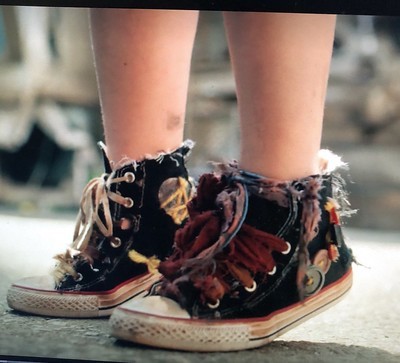
I was super moved by the final episode (in spite of a plot mechanic that frustrated me) because it spoke to how I feel about the social situation in the United States right now (even though the show is Brazilian). It gave me the ending I want for us. Spoiler cut ahead! But if you're not going to see the show or don't mind about spoilers, read on ahead, or better yet, just watch the first few moments of the video of the final scene, because it's beautiful and uplifting.
( spoilers )
Over the course of the four seasons, the characters find out the hidden history of how this process started and put into action various plans to counter the injustices of this system. All the characters end up doing things they deeply regret, in a way that sometimes feels like the creators jerking them around, but on the other hand gives them all a chastened human fallibility that's identifiable even when the decisions it resulted from are hard to credit.
There are problems with the setup that I could never quite get past (how both these places are provisioned, mainly), and one direction for a solution that's actually explored in the middle seasons (creation of an alternative to the Offshore) seems like it could have been explored more, in more different ways--basically I thought there were always more directions for change than the characters imagined--but within the limitations that the show marked out, I really wanted to see how the characters were going to sort things out--both societally and personally.
Brief aside: Everyone in the inland dresses in improbably fabulous rags--take a look at these sneakers!

I was super moved by the final episode (in spite of a plot mechanic that frustrated me) because it spoke to how I feel about the social situation in the United States right now (even though the show is Brazilian). It gave me the ending I want for us. Spoiler cut ahead! But if you're not going to see the show or don't mind about spoilers, read on ahead, or better yet, just watch the first few moments of the video of the final scene, because it's beautiful and uplifting.
( spoilers )
flu immunizations
Oct. 29th, 2019 11:16 amLook at this; two entries in one day--what is this, 2008? But it's because I had two very disparate thoughts that didn't sit nicely in the same post, so here you go.
When I did a unit on vaccines with my students, almost all of them were pro-vaccine ... with the exception of the flu vaccine. Many more people were on the fence about that or were actively opposed to it. The flu vaccine has the problem of being a best guess as opposed to a sure thing in terms of how relevant and effective it'll be against whatever strains of flu happen to go around, and I bet that contributes to people's feelings. With polio or measles or whooping cough, you're talking about just one illness, and the immunization is very effective; with the flu, you're talking about lots of different types of flu, and the vaccine may or may not be that effective.
Relatedly, we've been watching (against my mild objections; I guess I can tolerate the show) Arrow on Netflix, and in one episode, a drug dealer had a plan to create a citywide market of addicts by lacing a flu vaccine with the drug, so everyone who got a flu shot became addicted. "Thanks, show; great way to play to people's fears of the flu vaccine!" I shouted at the screen--and then started thinking about how this particular flavor of suspicion feels equivalent to the fears that people in Pakistan have with regard to the polio vaccine--that a purported good thing (immunization against a harmful illness) is being used by shady actors to accomplish a nefarious purpose.
When I did a unit on vaccines with my students, almost all of them were pro-vaccine ... with the exception of the flu vaccine. Many more people were on the fence about that or were actively opposed to it. The flu vaccine has the problem of being a best guess as opposed to a sure thing in terms of how relevant and effective it'll be against whatever strains of flu happen to go around, and I bet that contributes to people's feelings. With polio or measles or whooping cough, you're talking about just one illness, and the immunization is very effective; with the flu, you're talking about lots of different types of flu, and the vaccine may or may not be that effective.
Relatedly, we've been watching (against my mild objections; I guess I can tolerate the show) Arrow on Netflix, and in one episode, a drug dealer had a plan to create a citywide market of addicts by lacing a flu vaccine with the drug, so everyone who got a flu shot became addicted. "Thanks, show; great way to play to people's fears of the flu vaccine!" I shouted at the screen--and then started thinking about how this particular flavor of suspicion feels equivalent to the fears that people in Pakistan have with regard to the polio vaccine--that a purported good thing (immunization against a harmful illness) is being used by shady actors to accomplish a nefarious purpose.
A revenge tale
Oct. 18th, 2019 02:32 pmThese days we're watching two Spanish-language shows on Netflix. One is La Reina del Flow (The Queen of Flow), an 82-episode-long revenge tale that we're only 30 episodes into. Talented teen lyricist Yeimi Montoya is invited by her best pal, Juancho, to join Soul and Bass, a duo consisting of Juancho and another teen, Charly Cruz, whom Yeimi has a huge crush on, but who has never even noticed her. (Juancho, in turn, loves Yeimi, but she only thinks of him as a friend.) All three of them are barrio kids on the outskirts of Medellín, but Charlie has a pretty face, and Soul and Bass has a good tunes--with Yeimi's lyrics they might just get a recording deal. Unfortunately Charly is a self-absorbed narcissist with a crime lord for an uncle.
We need to spend a moment on the uncle, Manín. He is likely to have killed Charly's dad (though at episode 30, that's still not certain) in order to put the moves on Charly's mom, who eventually does acquiesce and marry him. He's ordered Yeimi's bakery-running parents killed when they're unable to make a protection payment. He slouches everywhere and is usually eating something, or drinking.
Manín has been in the habit of strong-arming Charly into doing jobs for him, and in one of those jobs, he ends up killing someone--and Yeimi witnesses it. She insists Charly turn himself in, but *that* certainly isn't happening--instead Charly asks his uncle for help, and next thing you know, Yeimi is in prison in the United States for acting as a drug mule (Charly having planted drugs on her when they head to New York to meet a producer). Charly also steals her notebook of lyrics, so he can keep on creating hit songs. Oh, and he seduced her, so she gives birth in prison and then gives the baby to her grandmother--but Manín kills the grandmother and steals the baby, because Charly's mom--now Manín's wife--wants another baby. He doesn't say anything about the baby's parentage, so now that child, who's actually Charly's son, is being raised as Charly's brother. The same actor plays this child, Erik, and young-Charly (glasses and a different hair style distinguishing them).
Got the picture? So 17 years later, when a DEA agent offers Yeimi a chance to get out of prison if she helps to catch the uncle, she agrees, reasoning that she can use this chance to get revenge on Charly, who's now the successful reggaeton star Charly Flow,** with a beautiful wife and daughter. In the guise of Tammy Andrade, music producer and talent scout, she intends to take away from Charly everything that he's taken away from her.
So... you sympathize with her, and Charly really is a self-involved asshole. But the story takes you into the lives of Charly's wife and daughter, too, and it's clear that Yeimi's mission is going to have profound collateral damage. Juancho is still around, running a recording studio, and when Tammy reveals that she's actually Yeimi, he urges her to get the ultimate revenge, which is to lead a happy life and to forget about revenge. So the show has this tension, because on the one hand it invites you in for vengeful wish fulfillment, but on the other hand, it highlights the problems with this. But if you begin to truly think it's a problem, then you can't root for Yeimi wholeheartedly. Or maybe at all?
I'm not a huge fan of how the actress who plays grow-up Yeimi portrays her--but it's probably in part down to the writing and the directing. I'm hoping they'll add something to enrich her character. I suspect they will--the trailer shows her recording her own songs, and that hasn't happened yet, and we still have 52 episodes to fill. Right now I have more sympathy for Charly's wife, whom we're meant, I think, to see as self-absorbed the same way Charly is, but who's struggling to raise their daughter and put together a life for herself ... she feels more three-dimensional to me that Yeimi.
The other Spanish-language show we're watching is Frontera Verde, a *completely* different type of show, which takes place in the Amazon--but I'll talk about that another time.
Trailer for Reina del Flow
**Based visually on Colombian reggaeton star Maluma:
grown-up Charly
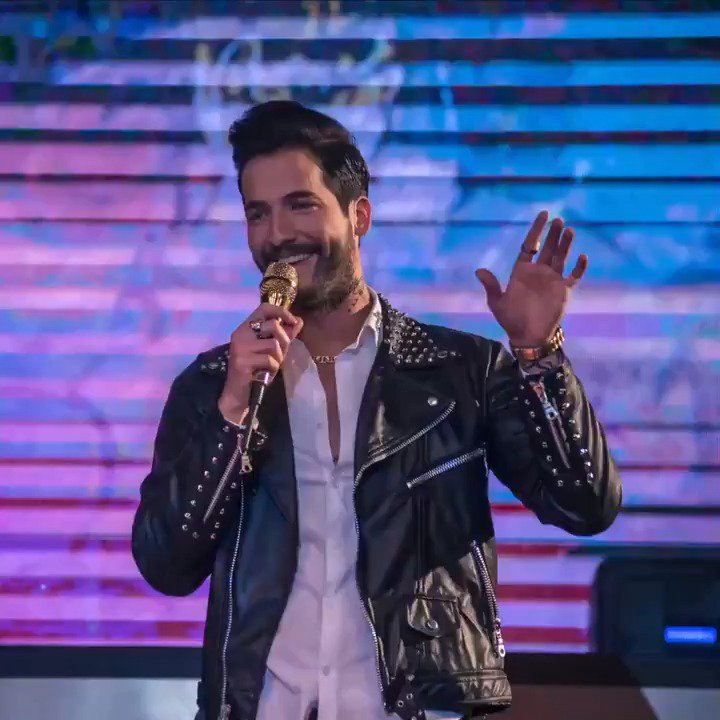
Maluma

... ughh, and while I don't usually care about spoilers, in looking for those images I've inadvertently seen one I sort of do care about.
We need to spend a moment on the uncle, Manín. He is likely to have killed Charly's dad (though at episode 30, that's still not certain) in order to put the moves on Charly's mom, who eventually does acquiesce and marry him. He's ordered Yeimi's bakery-running parents killed when they're unable to make a protection payment. He slouches everywhere and is usually eating something, or drinking.
Manín has been in the habit of strong-arming Charly into doing jobs for him, and in one of those jobs, he ends up killing someone--and Yeimi witnesses it. She insists Charly turn himself in, but *that* certainly isn't happening--instead Charly asks his uncle for help, and next thing you know, Yeimi is in prison in the United States for acting as a drug mule (Charly having planted drugs on her when they head to New York to meet a producer). Charly also steals her notebook of lyrics, so he can keep on creating hit songs. Oh, and he seduced her, so she gives birth in prison and then gives the baby to her grandmother--but Manín kills the grandmother and steals the baby, because Charly's mom--now Manín's wife--wants another baby. He doesn't say anything about the baby's parentage, so now that child, who's actually Charly's son, is being raised as Charly's brother. The same actor plays this child, Erik, and young-Charly (glasses and a different hair style distinguishing them).
Got the picture? So 17 years later, when a DEA agent offers Yeimi a chance to get out of prison if she helps to catch the uncle, she agrees, reasoning that she can use this chance to get revenge on Charly, who's now the successful reggaeton star Charly Flow,** with a beautiful wife and daughter. In the guise of Tammy Andrade, music producer and talent scout, she intends to take away from Charly everything that he's taken away from her.
So... you sympathize with her, and Charly really is a self-involved asshole. But the story takes you into the lives of Charly's wife and daughter, too, and it's clear that Yeimi's mission is going to have profound collateral damage. Juancho is still around, running a recording studio, and when Tammy reveals that she's actually Yeimi, he urges her to get the ultimate revenge, which is to lead a happy life and to forget about revenge. So the show has this tension, because on the one hand it invites you in for vengeful wish fulfillment, but on the other hand, it highlights the problems with this. But if you begin to truly think it's a problem, then you can't root for Yeimi wholeheartedly. Or maybe at all?
I'm not a huge fan of how the actress who plays grow-up Yeimi portrays her--but it's probably in part down to the writing and the directing. I'm hoping they'll add something to enrich her character. I suspect they will--the trailer shows her recording her own songs, and that hasn't happened yet, and we still have 52 episodes to fill. Right now I have more sympathy for Charly's wife, whom we're meant, I think, to see as self-absorbed the same way Charly is, but who's struggling to raise their daughter and put together a life for herself ... she feels more three-dimensional to me that Yeimi.
The other Spanish-language show we're watching is Frontera Verde, a *completely* different type of show, which takes place in the Amazon--but I'll talk about that another time.
Trailer for Reina del Flow
**Based visually on Colombian reggaeton star Maluma:
grown-up Charly

Maluma

... ughh, and while I don't usually care about spoilers, in looking for those images I've inadvertently seen one I sort of do care about.
notes from a land of delight
Aug. 2nd, 2019 02:47 pmI pass this veggie stand on the way to work every day, and I always contemplate stopping, but until last Tuesday, I never did.

A big old tree provides shade, and two elderly white guys sit in outdoor chairs by it, every day. Tuesday was a steamy hot day. I bought some green beans--"first of the season," one of the old guys told me--and a beautiful eggplant. I was able to see their rambling garden back behind the stand. Wonderful.
As a goodbye remark, I told them to stay cool. "I love the heat!" the other guy proclaimed. "I changed my shirt once already today! Love it! Love being out in the garden!"
I love the heat too, but it's rare to find others who do. I left charmed and delighted. I'm going to buy more eggplant there.
(There's a more sturdy farmstand right near my house; I go there too. What a blessing.)
This cabbage white butterfly looks like the protagonist of a fairy tale. Her beauty is matched by her fearlessness and her creative thinking.

This is a public planter. I like it! I particularly like the yellow vine flowers, which I discovered are Thunbergia alata, "black-eyed susan vine." I saw them first--or, well, noticed them first--in Colombia, cascading down walls. They're apparently native to East Africa, but naturalized in places like Brazil and Puerto Rico (and maybe Colombia?) I want to grow some, so I ordered a packet of seeds. It'll be late by the time they get here, but maybe if the plants once start, I can have them indoors. We'll see.

And here is some sidewalk art from Amherst, MA:

The third season of She-ra is out! So we can watch that now. Meanwhile, we've been watching Evangelion (I've seen it once before, but long ago), which means having the theme song ALWAYS IN MY HEAD.


A big old tree provides shade, and two elderly white guys sit in outdoor chairs by it, every day. Tuesday was a steamy hot day. I bought some green beans--"first of the season," one of the old guys told me--and a beautiful eggplant. I was able to see their rambling garden back behind the stand. Wonderful.
As a goodbye remark, I told them to stay cool. "I love the heat!" the other guy proclaimed. "I changed my shirt once already today! Love it! Love being out in the garden!"
I love the heat too, but it's rare to find others who do. I left charmed and delighted. I'm going to buy more eggplant there.
(There's a more sturdy farmstand right near my house; I go there too. What a blessing.)
This cabbage white butterfly looks like the protagonist of a fairy tale. Her beauty is matched by her fearlessness and her creative thinking.

This is a public planter. I like it! I particularly like the yellow vine flowers, which I discovered are Thunbergia alata, "black-eyed susan vine." I saw them first--or, well, noticed them first--in Colombia, cascading down walls. They're apparently native to East Africa, but naturalized in places like Brazil and Puerto Rico (and maybe Colombia?) I want to grow some, so I ordered a packet of seeds. It'll be late by the time they get here, but maybe if the plants once start, I can have them indoors. We'll see.

And here is some sidewalk art from Amherst, MA:

The third season of She-ra is out! So we can watch that now. Meanwhile, we've been watching Evangelion (I've seen it once before, but long ago), which means having the theme song ALWAYS IN MY HEAD.

I never watched the original 1980s She-ra (though I was aware of its existence), but I'm loving Netflix's reboot. It's a real delight! The characters are mainly teens, and there's a friendship-oriented, work-together quality that reminds me of My Little Pony or Steven Universe. Instead of the female characters having identical Barbie-doll bodies and features, everyone's unique, and their personalities are a lot of fun.
The set-up is that Adora (OMG the names, but they're artifacts of the original show) and Catra are best friends who grew up in the Horde, but one day Adora discovers a magic sword and also that the Horde, rather than quelling rebels, has been destroying innocent villages, etc. etc., and so she switches sides. She invites Catra to come along with her, but Catra, who's been more aware of the true nature of the Horde all along, doesn't feel inclined to--maybe because she didn't get to find a magic sword, or maybe because Adora's realignment coincides with meeting two rebels, Glimmer and Bow, whom she pretty instantly becomes close friends with. It's a lot for Catra to swallow; she feels deeply betrayed. So now she has a personal reason to be against the rebels. But Adora being gone also lets Catra come into her own a little; she's kind of been in her friend's shadow.
In one episode, Catra (left) and Adora (right) see visions of their childhood selves
:no_upscale()/cdn.vox-cdn.com/uploads/chorus_asset/file/13599043/Screen_Shot_2018_12_03_at_3.44.10_PM.png)
Glimmer and Bow

... As you can see, I'm pretty invested in the bad guys, and the thing is, the show lets you be. It kind of reminds me of Team Rocket in the Pokémon cartoon--there's just a lot to like about the bad guys. Another awesome bad-guy character is Scorpia, a super-cheerful Horde force captain who desperately wants to be besties with Catra.
Scorpia on the right
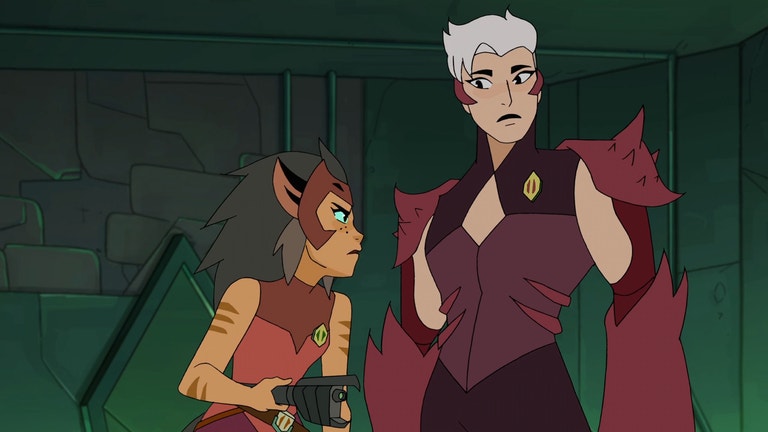
But the good guys are lots of fun too. It's hard to be the straight-arrow main character, but Adora does a great job. Her transformation into She-ra owes a lot to Sailor Moon's transformation sequences, and I watch it with delight each time.
There's also a social justice–oriented winged pegasus and all sorts of incidental humor. Adora tipsy as an after-effect of being infected by an evil-making virus makes for some great moments in a late episode in the second season, as does an episode in which attempting to make a battle plan devolves into a roleplay.
I've watched all that's available, but another season apparently will arrive in August. I can't wait! Those of you who've seen it, what things do you like best?
The set-up is that Adora (OMG the names, but they're artifacts of the original show) and Catra are best friends who grew up in the Horde, but one day Adora discovers a magic sword and also that the Horde, rather than quelling rebels, has been destroying innocent villages, etc. etc., and so she switches sides. She invites Catra to come along with her, but Catra, who's been more aware of the true nature of the Horde all along, doesn't feel inclined to--maybe because she didn't get to find a magic sword, or maybe because Adora's realignment coincides with meeting two rebels, Glimmer and Bow, whom she pretty instantly becomes close friends with. It's a lot for Catra to swallow; she feels deeply betrayed. So now she has a personal reason to be against the rebels. But Adora being gone also lets Catra come into her own a little; she's kind of been in her friend's shadow.
In one episode, Catra (left) and Adora (right) see visions of their childhood selves
:no_upscale()/cdn.vox-cdn.com/uploads/chorus_asset/file/13599043/Screen_Shot_2018_12_03_at_3.44.10_PM.png)
Glimmer and Bow

... As you can see, I'm pretty invested in the bad guys, and the thing is, the show lets you be. It kind of reminds me of Team Rocket in the Pokémon cartoon--there's just a lot to like about the bad guys. Another awesome bad-guy character is Scorpia, a super-cheerful Horde force captain who desperately wants to be besties with Catra.
Scorpia on the right

But the good guys are lots of fun too. It's hard to be the straight-arrow main character, but Adora does a great job. Her transformation into She-ra owes a lot to Sailor Moon's transformation sequences, and I watch it with delight each time.
There's also a social justice–oriented winged pegasus and all sorts of incidental humor. Adora tipsy as an after-effect of being infected by an evil-making virus makes for some great moments in a late episode in the second season, as does an episode in which attempting to make a battle plan devolves into a roleplay.
I've watched all that's available, but another season apparently will arrive in August. I can't wait! Those of you who've seen it, what things do you like best?
skateboarding
Feb. 16th, 2019 11:04 pmIn 2012, I was briefly a skateboarder. I loved the speed and grace and daring of it--I wanted to touch that and live that.
That time was brought back to me so vividly tonight watching Skate Kitchen (2018), which I requested from Netflix DVD because of![[personal profile]](https://www.dreamwidth.org/img/silk/identity/user.png) osprey_archer's excellent review) of it. The film coveys the feel of skateboarding beautifully (and also the dangers of it--part of why I quit: I loved the daring but wasn't up for the injuries), and I loved the posse of girls--real-life members of the Skate Kitchen, an all-girl skate collective in New York City. The director apparently met members of the collective while riding the subway, and she used Rachelle Vinberg, who plays the main character in Skate Kitchen, in a 2016 short film, That One Day.
osprey_archer's excellent review) of it. The film coveys the feel of skateboarding beautifully (and also the dangers of it--part of why I quit: I loved the daring but wasn't up for the injuries), and I loved the posse of girls--real-life members of the Skate Kitchen, an all-girl skate collective in New York City. The director apparently met members of the collective while riding the subway, and she used Rachelle Vinberg, who plays the main character in Skate Kitchen, in a 2016 short film, That One Day.
The scenes of New York City's skating haunts are ones I remember from a video of skateboarding I found and posted back in 2012--it made the movie feel extra real to me.
The trailer pretty accurately captures the feel of the film:
And![[personal profile]](https://www.dreamwidth.org/img/silk/identity/user.png) osprey_archer, the quote you were trying to find is the voiceover at the start of the trailer (and the scene with the little girl is in the trailer too). You're right: it's beautiful.
osprey_archer, the quote you were trying to find is the voiceover at the start of the trailer (and the scene with the little girl is in the trailer too). You're right: it's beautiful.
That time was brought back to me so vividly tonight watching Skate Kitchen (2018), which I requested from Netflix DVD because of
The scenes of New York City's skating haunts are ones I remember from a video of skateboarding I found and posted back in 2012--it made the movie feel extra real to me.
The trailer pretty accurately captures the feel of the film:
And
Leave No Trace
Dec. 31st, 2018 08:29 amInitially I hadn't been thrilled by the notion of this film; I think because I feared (completely unjustifiably) that it would be purveying trite truths of one sort or another. But several of my friends reviewed it favorably, and finally last night I got to see it--and really loved it.
It's a totally different kind of film from Winter's Bone (by the same director), a very **gentle** story, and quiet, even though elements of the story aren't gentle at all. In fact, all through the movie there were moments when, primed by what Hollywood often does, I was on the edge of my seat expecting something horrible to happen--and it didn't.
The situation is that Tom (a girl) has been living with her PTSD-suffering war-veteran father in a national park, foraging, growing their own food, collecting rainwater--and occasionally going into town to buy things (which they finance by dad selling the medication he gets from the VA to other vets). They get found out and forced to reassimilate into society. Tom is adjusting, but her dad is not, and he announces they're taking off again. Reluctantly, she leaves with him, but things are much harder and grimmer this time around.
What I loved about it most were the moments with animals and the sense of how healing and enriching sharing time and space with animals can be. There's a scene where the dad is stroking a horse, and the horse rests its head against the dad, and the dad rests his head against the horse, and they're just still together for a moment, and oh my heart! Same with Tom stroking a rabbit she finds hopping along the road and returns to its owner; same later on when an older woman shows her the miracle of a hive of bees.
The beauty of the natural world resonates through the whole film, too, but the film understands that it's beauty that will kill you if you're underprepared--and Tom and her father understand that; in fact, everyone in the movie understands the situation and everyone else pretty well: the problem is what people can live with.
Thinking about everyone understanding brings up another thing I liked about the film: there wasn't really a villain. Even the state isn't villainous: it tries its best to accommodate Tom and her dad's unique needs within a framework of what's societally acceptable. It's just that it won't work for the dad.
I think that's the saddest thing in the film--that the dad just can't feel at ease in, apparently, any situation near other people, except his daughter, whom he loves very much, whereas she's growing into a person who wants to be near other people, though she loves her dad very much. But I'd call the ending happy: it's a good one for Tom, and it's set up in the film as one that's not doom-and-death for the dad either.
It's a totally different kind of film from Winter's Bone (by the same director), a very **gentle** story, and quiet, even though elements of the story aren't gentle at all. In fact, all through the movie there were moments when, primed by what Hollywood often does, I was on the edge of my seat expecting something horrible to happen--and it didn't.
The situation is that Tom (a girl) has been living with her PTSD-suffering war-veteran father in a national park, foraging, growing their own food, collecting rainwater--and occasionally going into town to buy things (which they finance by dad selling the medication he gets from the VA to other vets). They get found out and forced to reassimilate into society. Tom is adjusting, but her dad is not, and he announces they're taking off again. Reluctantly, she leaves with him, but things are much harder and grimmer this time around.
What I loved about it most were the moments with animals and the sense of how healing and enriching sharing time and space with animals can be. There's a scene where the dad is stroking a horse, and the horse rests its head against the dad, and the dad rests his head against the horse, and they're just still together for a moment, and oh my heart! Same with Tom stroking a rabbit she finds hopping along the road and returns to its owner; same later on when an older woman shows her the miracle of a hive of bees.
The beauty of the natural world resonates through the whole film, too, but the film understands that it's beauty that will kill you if you're underprepared--and Tom and her father understand that; in fact, everyone in the movie understands the situation and everyone else pretty well: the problem is what people can live with.
Thinking about everyone understanding brings up another thing I liked about the film: there wasn't really a villain. Even the state isn't villainous: it tries its best to accommodate Tom and her dad's unique needs within a framework of what's societally acceptable. It's just that it won't work for the dad.
I think that's the saddest thing in the film--that the dad just can't feel at ease in, apparently, any situation near other people, except his daughter, whom he loves very much, whereas she's growing into a person who wants to be near other people, though she loves her dad very much. But I'd call the ending happy: it's a good one for Tom, and it's set up in the film as one that's not doom-and-death for the dad either.
A while ago I saw Tanna (2015), a love story that takes place in Vanuatu and involves a volcano, and is acted entirely in the local languages, Nauvhal and Nafe. Well it turns out that 2015 was *the* year for movies featuring a volcano and acted in non-dominant languages, because that was the year that Ixcanul, a film set on the slopes of a volcano and acted almost entirely in Kaqchikel, a Mayan language, came out. A couple of nights ago, we saw it.
The trailer for it might lead you to believe it was a love story, and the Netflix blurb is accurate only for the first third or maybe half the film ("A Mayan girl working on a Guatemalan coffee plantation dreams of escaping an arranged marriage to make a new life in America")
Instead, it went in directions I didn't expect, with characters acting in ways I didn't expect (but was gratified by), developing, in particular, a really touching mother-daughter relationship, but there are all sorts of touches, small and large, that appealed (including, for example, some tenacious, and dangerous, but also sacred, snakes).
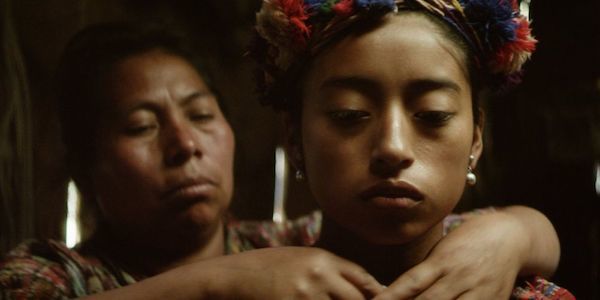
Has anyone else seen it? What did you think?
The trailer for it might lead you to believe it was a love story, and the Netflix blurb is accurate only for the first third or maybe half the film ("A Mayan girl working on a Guatemalan coffee plantation dreams of escaping an arranged marriage to make a new life in America")
Instead, it went in directions I didn't expect, with characters acting in ways I didn't expect (but was gratified by), developing, in particular, a really touching mother-daughter relationship, but there are all sorts of touches, small and large, that appealed (including, for example, some tenacious, and dangerous, but also sacred, snakes).

Has anyone else seen it? What did you think?
Haunting of Hill House
Nov. 10th, 2018 04:21 pmThe healing angel and I watched this--I liked it a lot, especially in the sense that it's a family dealing with deep, ongoing trauma and loss. I'm vaguely aware of people expressing discontent at the ending, but I found it satisfying. What did dissatisfy me was the logical mechanism of the malevolent supernatural element, but the healing angel and I hashed it out at length, and I feel like like we arrived at (slightly different) ways of understanding it that made sense. For those of you who watched it, what were your feelings?
Leidy Tabares
Nov. 22nd, 2017 12:11 pmHaving finished La Niña, Wakanomori and I found a new, non-narco (this rules out the majority of what's available on Netflix) Colombian telenovela to watch: Lady: La Vendedora de Rosas. It's very loosely based on the life of Leidy (Lady) Tabares, a Colombian streetkid who got lifted up to glory as the star of a film called La Vendedora de Rosas [the rose seller] (1998) aaaannnnd then dumped right back into the situation from which she came. Gotta love exploitative directors.
The real Leidy Tabares spent twenty years in jail for charges of accessory to murder (although this Guardian article casts doubt on whether she was really guilty)--but recently was freed and has married her girlfriend. Here's a picture of her with Natalia Reyes, the actress who plays teenage-her in telenovela:
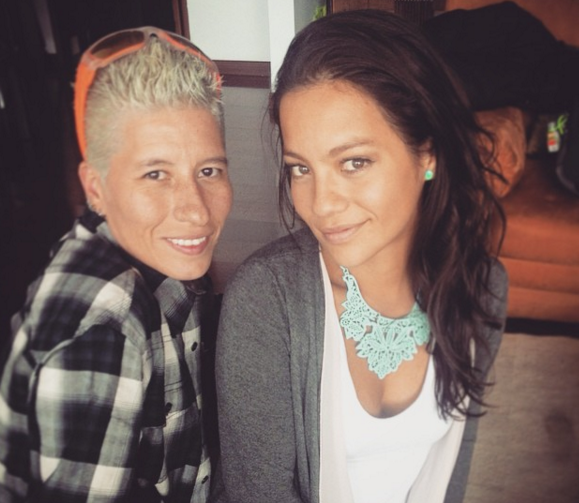
(Source)
With this novela, you see bad stuff coming a thousand miles away and just have to watch as it gets closer and closer and closer, all the while wanting to scream to the characters to do X or Y or Z to avoid it, but no, they're not going to. So what you're watching for is how fate will unfold and what grace there'll be within the strictures that confine people.
It's got an absolutely hopping soundtrack. Here's my favorite song: Sueños cumplidos
Here's the CD case I made for the soundtrack, which I bought.
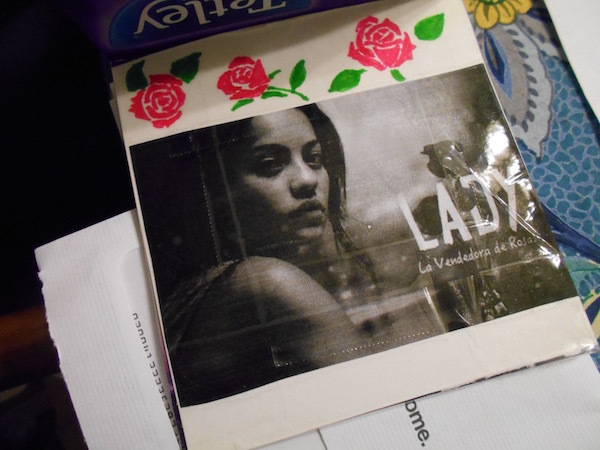
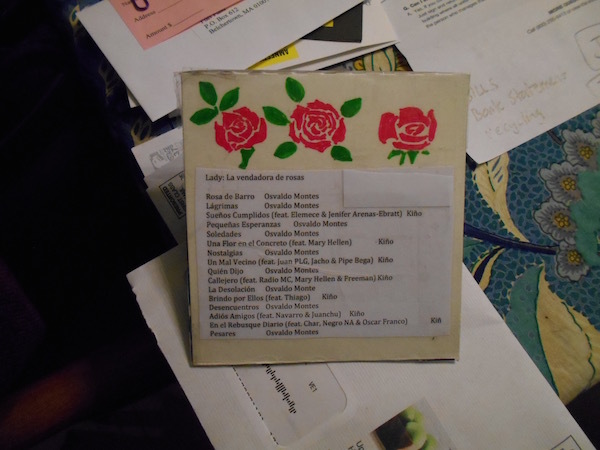
Gotta have this picture, too:
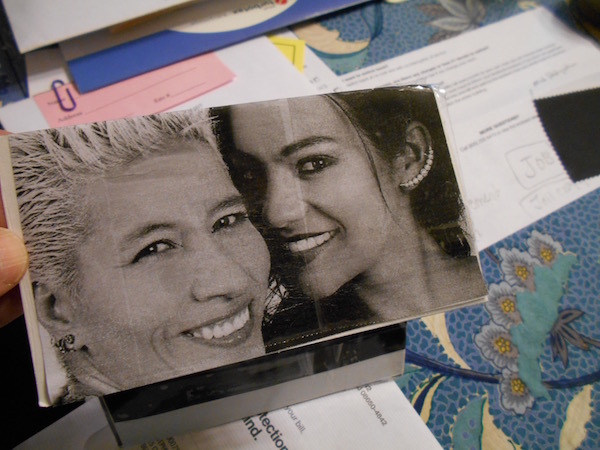
The real Leidy Tabares spent twenty years in jail for charges of accessory to murder (although this Guardian article casts doubt on whether she was really guilty)--but recently was freed and has married her girlfriend. Here's a picture of her with Natalia Reyes, the actress who plays teenage-her in telenovela:

(Source)
With this novela, you see bad stuff coming a thousand miles away and just have to watch as it gets closer and closer and closer, all the while wanting to scream to the characters to do X or Y or Z to avoid it, but no, they're not going to. So what you're watching for is how fate will unfold and what grace there'll be within the strictures that confine people.
It's got an absolutely hopping soundtrack. Here's my favorite song: Sueños cumplidos
Here's the CD case I made for the soundtrack, which I bought.


Gotta have this picture, too:

La Niña, finished! Overall impressions
Oct. 13th, 2017 11:35 amThe ending of this show was intensely satisfying and mainly (maybe not entirely) realistic. Thinking back over the entire story arc and all the characters, I do have a few criticisms, but mainly so much love and so much admiration for the storycraft and the character development. It would be an excellent show to use with kids to get them thinking about how characters grow and change (and why this is important) and what motivations are--but beyond all that, it's so engaging!
My main criticism was that the main conflict for Belky, the protagonist, gets sorted out three-fourths of the way through the show, and then, rather than simply focusing on remaining conflicts/difficulties, which are not as high-color but very important (things about how she relates with her boyfriend and her family--that sort of thing), a whole new existential threat is introduced, one that's kind of cheap and tired compared with everything else in the show. Furthermore, it involves Belky, who's generally wary and mistrustful, trusting a simply odious character, and while the show's at pains to show how that character wins her trust, it still just doesn't seem likely. And, it's very hard to focus on the very interesting stories of the side characters when there's this existential threat hanging over Belky. I would have been happier without that storyline, honestly.
BUT STILL. The remaining storylines develop the main supporting characters wonderfully. People make bad decisions for good reasons and then have to extricate themselves. People have to take emotional risks, and it isn't easy. There are lots of excellent heart-to-heart conversations.
And the show is really progressive, too: there's a young lawyer who's wheelchair bound who gets to be heroic and who gets a happily ever after: he's just the right person for the woman he ends up with. There's a gay guy who's portrayed as an accomplished, brave, smart person, who's always wanted to be a father and is able to co-parent with a single mother, while maintaining his romantic life separately. Belky has a moving conversation with the older of her two younger sisters about becoming sexually active and making it be about her choice and not something she's pressured into. Public, pressureful marriage proposals and apologies are shown to be NOT A GOOD IDEA.
And more and more--but this is enough for now. Gotta get back to the day's tasks.
My main criticism was that the main conflict for Belky, the protagonist, gets sorted out three-fourths of the way through the show, and then, rather than simply focusing on remaining conflicts/difficulties, which are not as high-color but very important (things about how she relates with her boyfriend and her family--that sort of thing), a whole new existential threat is introduced, one that's kind of cheap and tired compared with everything else in the show. Furthermore, it involves Belky, who's generally wary and mistrustful, trusting a simply odious character, and while the show's at pains to show how that character wins her trust, it still just doesn't seem likely. And, it's very hard to focus on the very interesting stories of the side characters when there's this existential threat hanging over Belky. I would have been happier without that storyline, honestly.
BUT STILL. The remaining storylines develop the main supporting characters wonderfully. People make bad decisions for good reasons and then have to extricate themselves. People have to take emotional risks, and it isn't easy. There are lots of excellent heart-to-heart conversations.
And the show is really progressive, too: there's a young lawyer who's wheelchair bound who gets to be heroic and who gets a happily ever after: he's just the right person for the woman he ends up with. There's a gay guy who's portrayed as an accomplished, brave, smart person, who's always wanted to be a father and is able to co-parent with a single mother, while maintaining his romantic life separately. Belky has a moving conversation with the older of her two younger sisters about becoming sexually active and making it be about her choice and not something she's pressured into. Public, pressureful marriage proposals and apologies are shown to be NOT A GOOD IDEA.
And more and more--but this is enough for now. Gotta get back to the day's tasks.
La Niña: Post Two of Two
Sep. 4th, 2017 07:48 amNeedless to say, watching La Niña has made me curious about Colombia. My knowledge of it until now could be described by catchphrases from TV shows ("Colombian drug lords" "Cali cartel") and NPR headlines ("Colombia's FARC rebels [verb]" "Referendum on peace with FARC rebels"), plus an article on "biblioburros"--the project of a guy who acts as a bookmobile--only by donkey--bringing books to isolated communities--and the travels of someone I follow on Twitter, who visited there with her young daughter.
So first off, I wanted a better sense of where everything in Colombia is.
Here's a map, courtesy of the Rough Guide travel series:

Source
As you can see, pretty much ALL the large cities are in the northwest. What you can't see in the map is that a high mountain range extends along that easternmost diagonal of towns. Bogotá is up in those mountains, and in the show, you get a sense of its high mountainousness.
Here's a photo--not from the show--that gives a sense of that.
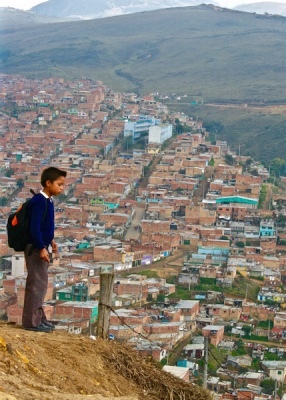
Source
Now here's a map, courtesy of Al-Zajeera, showing areas of guerrilla influence
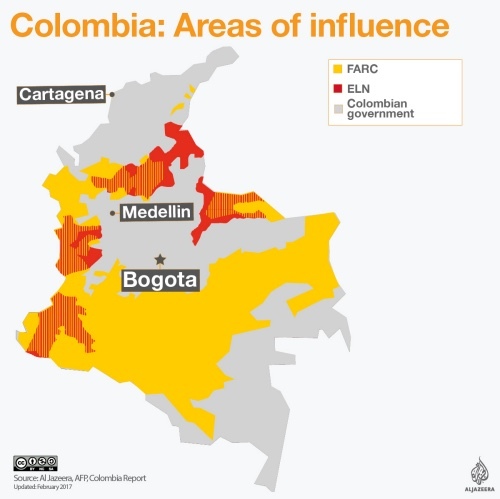
Source
The peace that was signed in November 2016 was with the FARC forces. Negotiations are still ongoing with the ELN.
ETA: Wow, and breaking news today: "Colombian Government and ELA Agree Ceasefire"
I'm not very experienced with Latin American television, but one thing I noticed about this show, as opposed to 3%, the Brazilian sci-fi Netflix offering I watched some time ago, was that this show was relatively whitewashed. Here are some actual FARC guerrillas (credits below the photos).

Photographer: Stephen Ferry, for the Guardian

Girls on the eve of demobilization
Photographer: Raul Arboleda, for the Atlantic

Guerrillas and civilians
Photographer: Federico Rios, for the British Journal of Photography
Compare those photos with the actors' pics from the previous post, and you'll see what I mean.
On the other hand, it's interesting to see telenovelas' role as a vehicle of public education in action. For instance, the older of Belky's two younger sisters wants to go riding on motorbikes with boys, and Belky's mom is sure she'd going to end up pregnant. The show has them go and talk to one of the doctors at Belky's university, who explains about contraception, confidentiality, etc.
Nana, the older of Belky's two younger sisters.
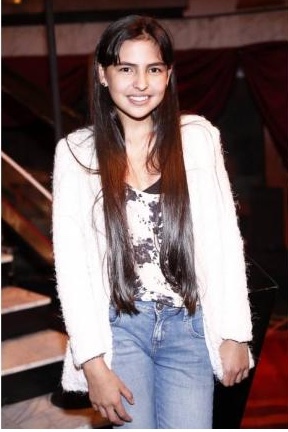
And, Wakanomori noticed, *no one*--not a single person--is shown smoking. No one in the army, no one in the guerrillas, no one on the streets. [ETA: very late in the show one obnoxious character and his friends are shown smoking, but that's the only case, and the smoking is made a big deal of as part of what makes the guy obnoxious]
The theme song for the show is also very appealing. It's Herencia de Timbiquí's "Te invito"--take a listen.
So first off, I wanted a better sense of where everything in Colombia is.
Here's a map, courtesy of the Rough Guide travel series:

Source
As you can see, pretty much ALL the large cities are in the northwest. What you can't see in the map is that a high mountain range extends along that easternmost diagonal of towns. Bogotá is up in those mountains, and in the show, you get a sense of its high mountainousness.
Here's a photo--not from the show--that gives a sense of that.

Source
Now here's a map, courtesy of Al-Zajeera, showing areas of guerrilla influence

Source
The peace that was signed in November 2016 was with the FARC forces. Negotiations are still ongoing with the ELN.
ETA: Wow, and breaking news today: "Colombian Government and ELA Agree Ceasefire"
I'm not very experienced with Latin American television, but one thing I noticed about this show, as opposed to 3%, the Brazilian sci-fi Netflix offering I watched some time ago, was that this show was relatively whitewashed. Here are some actual FARC guerrillas (credits below the photos).

Photographer: Stephen Ferry, for the Guardian

Girls on the eve of demobilization
Photographer: Raul Arboleda, for the Atlantic

Guerrillas and civilians
Photographer: Federico Rios, for the British Journal of Photography
Compare those photos with the actors' pics from the previous post, and you'll see what I mean.
On the other hand, it's interesting to see telenovelas' role as a vehicle of public education in action. For instance, the older of Belky's two younger sisters wants to go riding on motorbikes with boys, and Belky's mom is sure she'd going to end up pregnant. The show has them go and talk to one of the doctors at Belky's university, who explains about contraception, confidentiality, etc.
Nana, the older of Belky's two younger sisters.

And, Wakanomori noticed, *no one*--not a single person--is shown smoking. No one in the army, no one in the guerrillas, no one on the streets. [ETA: very late in the show one obnoxious character and his friends are shown smoking, but that's the only case, and the smoking is made a big deal of as part of what makes the guy obnoxious]
The theme song for the show is also very appealing. It's Herencia de Timbiquí's "Te invito"--take a listen.